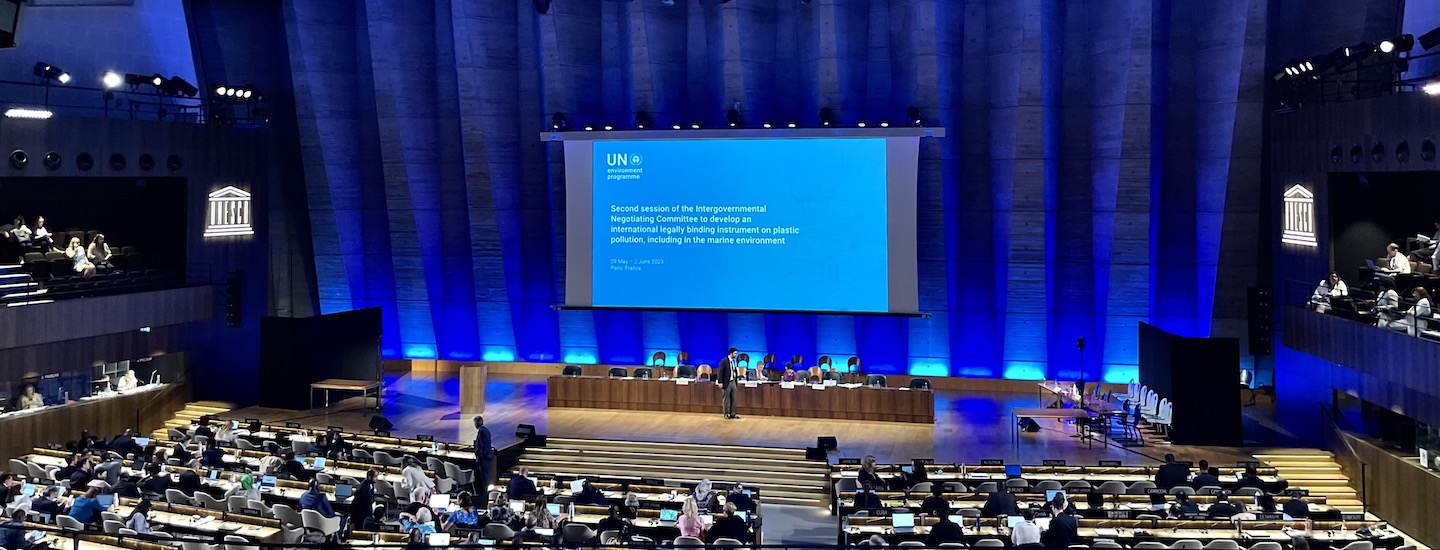
(Jump straight to taking action here!)
After seeing the first day of work on the Global Plastic Treaty derailed due to procedural delays by nations vested in expanding plastic production, those of us dedicated to stopping plastic harm felt our frustration grow as the situation repeated itself for the next two days. By the time delegates to the second session of the International Negotiating Committee (INC-2) began discussing the potential direction of the treaty, we’d reached Wednesday night, effectively cutting time to do the meaningful labor by more than half.
This is time we don’t have to lose. Our ocean is already full of “plastic smog” with the amount of plastic in the ocean expected to double every six years at the current rate. The solution requires much more than high-tech cleanups or recycling promises. If we truly want to be able to protect and enjoy our ocean, beaches and waves – to reduce the harm to ocean creatures and human health – we must reduce the amount of plastic we’re putting into the world. The Global Plastics Treaty is an opportunity to get it right. It has the potential to be one of the most significant environmental agreements in history.
Even as the stalling took a toll on the planet – every minute lost contributes to the crisis – and the mental state of attendees, it emphasized the importance of being in the room when political decisions are being made even when “nothing” is happening. Maybe especially when “nothing” is happening. Without eyes on the players, without being able to adapt, respond and advocate in real time, activists operate at a disadvantage. Not all information can be gathered via webcasts and press reports! So, those of us gathered at UNESCO headquarters in Paris, France continued to talk to the media, apply pressure and gather info as we were able. And, finally, the meeting moved forward.
This meant we could hear directly from delegates where the countries they represent stand on the plastic crisis. Would they articulate the “high ambition” standards? Would they downplay the damage done during plastic’s production phase and describe plastic pollution as only a “waste management” problem? Would they talk a good game on commitments but insist those commitments be merely voluntary? Yes, yes, and yes.
These are some of the key elements required for meaningful change and an end to the plastic crisis:
- Prioritizing environmental and social justice;
- A significant reduction of plastic production and the elimination of single-use plastics;
- Eliminating toxic materials;
- Prioritizing reuse and refill systems;
- Requiring producer responsibility;
- Providing a means for equitable global funding;
- Binding – not voluntary – commitments.
Unfortunately, although the United States continues to acknowledge the environmental and human harm done at every stage of plastic production, representatives also consistently call for voluntary measures and sidestep global accountability. Public comment in this situation is extremely limited, but Surfrider continues to work with our U.S.-based allies to insist our country do better. We’re also engaging with our global affiliate network to create pressure across the world to ensure the Global Plastic Treaty truly reverses the tide of plastic pollution, making our ocean, beaches and waves safer and happier places to be.
Further reading
- Global Plastic Treaty Negotiations in Paris – Day 1
- Meeting in Uruguay marks major step in Global Plastics Treaty
- A Step Closer to An International Treaty on Plastics – Surfrider Europe
- Plastic in Paradise – Solving a Worldwide Trash Problem Requires a Global Solution
- Fighting Plastic Pollution Across the Globe: Surfrider Presents at International Conference
- Global Plastics Treaty – Negotiations Begin
